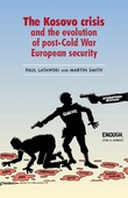Explore

The Kosovo crisis and the evolution of post-Cold War European security
Paul Chester Latawski and Martin A. Smith
2003
2 Ungluers have
Faved this Work
Login to Fave
This book looks at the legacy of the 1998-99 Kosovo crisis for European security affairs. It examines the debates about the nature and justification of intervention in the affairs of sovereign states. It also considers the impact of the crisis on NATO and on relations between western states and Russia both during and since Kosovo. Well-known 'facts' are critically assessed and challenged. The authors argue, for example, that the NATO attacks on Serbia were not a 'war', nor did the crisis directly lead to moves to endow the European Union with its own military dimension. The authors also look at key issues and debates that have, so far, often been neglected. They consider the difficulties of entrenching 'western' norms and values in areas where ethnic conceptions of national identity are dominant. They also place the Kosovo crisis in the context of the long-term evolution of a transatlantic 'community of values' between Europe and North America.
This book is included in DOAB.
Why read this book? Have your say.
You must be logged in to comment.
Rights Information
Are you the author or publisher of this work? If so, you can claim it as yours by registering as an Unglue.it rights holder.Downloads
This work has been downloaded 741 times via unglue.it ebook links.
- 385 - pdf (CC BY-NC-ND) at OAPEN Library.
Keywords
- balkans
- European Union
- Foreign relations
- History
- History and criticism
- kosovo
- Kosovo (Serbia) Civil War, 1998-1999
- Kosovo War, 1998-1999
- National security
- NATO
- North Atlantic Treaty Organization
- Operation Allied Force, 1999
- Politics and government
- Russia
- security
- Society & Social Sciences
- thema EDItEUR::J Society and Social Sciences::JW Warfare and defence::JWL War and defence operations
- War & defence operations
- Warfare & Defence
Links
DOI: 10.7765/9781526137784Editions


